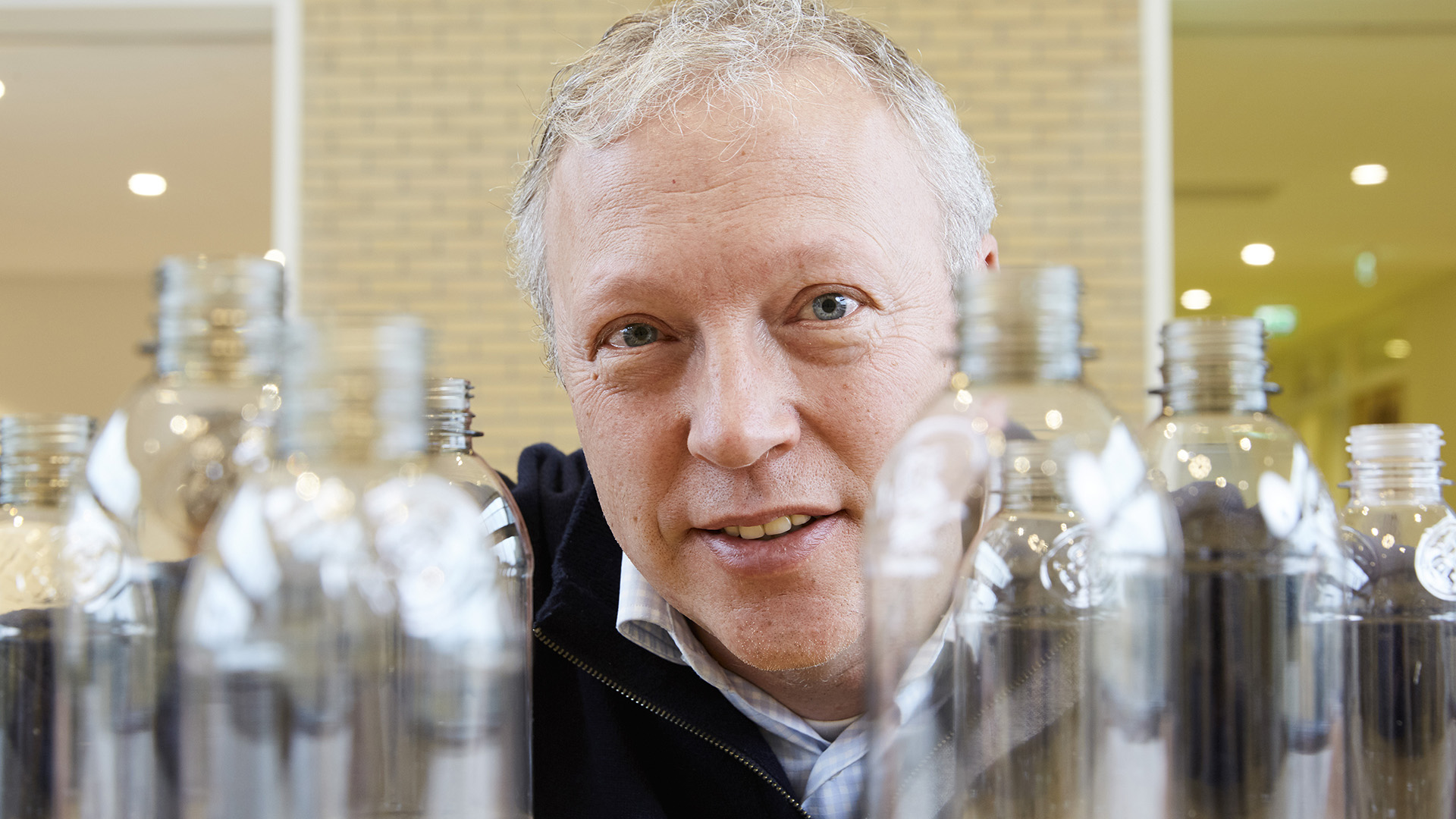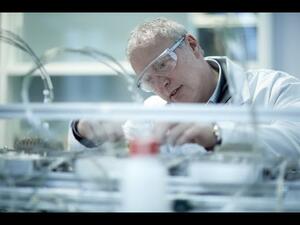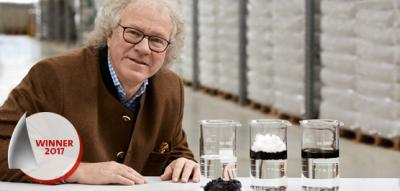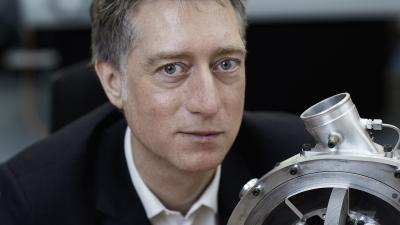Gert-Jan Gruter
Plant-based plastic bottles
Finalist for the European Inventor Award 2017
Gruter's invention is a new process for converting plant-based sugars into a chemical building block known as furandicarboxylic acid (FDCA). Overcoming a problem that had baffled chemists for nearly a century and a half, Gruter managed to synthesise large amounts of FDCA, enabling him to refine it into a new, superior polyester known as PEF (polyethylene furanoate). PEF has many of the same traits as conventional PET: it is robust, malleable and recyclable; yet it requires about 70% less energy to make. Plus, it's made from plants, not petroleum.
In his position as Chief Technology Officer at Avantium, Gruter achieved his breakthrough by trying a different approach to synthesising FDCA. Rather than attempting to create a molecule called HMF in water and then oxidise it into FDCA, which was what numerous scientists before him had done, Gruter used a solution of methanol alcohol and made an entirely different - and far more stable - molecule called MMF. This proved easy to distil, extract, purify and ultimately oxidise into large quantities of FDCA.
Societal benefit
The environmental benefits of PEF are undeniable. Its non-reliance on petroleum-based products eliminates any potential hazards tied to the extraction of its raw materials. (The same cannot be said of PET, which requires petrochemicals made from oil and natural gas.) Like PET, PEF can be completely recycled; however, unlike other polymers, PEF, in small amounts, can be recycled together with PET, without interfering with the process. For a new product, this is of immense value - it means PEF can effectively piggyback on PET's widespread recycling stream.
A plant-based polymer, PEF offers a number of other advantages over its petroleum-derived counterpart as well. It has greater material integrity, which means less material is required to make the same-sized plastic bottle. This saves not only on manufacturing costs, but also on energy required to produce bottles - a boon for both companies and consumers. As if that weren't enough, PEF is also more resistant and has demonstrated better barrier properties than PET. This means gases like CO2 and oxygen are kept away from a product - or in the case of soft drinks, kept inside the product - resulting in longer shelf life for food and beverages.
Economic benefit
The global market for PET plastic packaging is currently worth about EUR 54 billion (USD 57 billion), of which plastic bottles account for roughly EUR 32-37 billion. By 2021, it is forecast to jump to EUR 70 billion. To capitalise on this growth, Avantium has been working with its partners to scale up its production of PEF. In March 2016, it formed thejoint venture Synvina with German chemical company BASF SE to bring PEF bottles to market by 2021. To that end, an industrial-scale plant will be constructed in Antwerp, with an annual production capacity of up to 50 000 tonnes.
Avantium is also co-operating with companies including Coca-Cola and Danone. Avantium was founded in 2000 as a research services firm by a consortium of companies led by Royal Dutch Shell, but it has since grown into a technology company that recently raised EUR 103 million in a successful initial public offering, giving it a market capitalisation of EUR 264 million.
How it works
To synthesise FDCA, Gruter subjected plant-based sugars to what is known as a dehydration reaction. This takes place in water, which is important to the reaction's success, but the result is an unstable molecule called HMF that doesn't lend itself easily to distillation, extraction or purification.
This problem had plagued chemists ever since FDCA was first theorised about back in the late 1800s. To overcome this problem, Gruter used a solution of methanol alcohol instead of water. Rather than create HMF, he created a molecule called MMF, which was infinitely more stable. As it turned out, MMF could be much more easily oxidised into FDCA and, in turn, processed into large quantities of PEF.
The inventor
Gruter is driven by his desire to leave a lasting, positive impact on the environment by making the field of industrial chemistry - his life's work - more sustainable. "Today some 300 million tonnes of plastic are being used worldwide, and the volume will quadruple over the next 30 years to more than a billion tonnes," says Gruter. "To make the transition from fossil fuels to sustainable plastics, we have to rely on biomass. But for this we need new materials! That's the only way to bring about this change." This desire has informed his entire career.
As an undergraduate, Gruter majored in organic chemistry and minored in neutron activation. Afterwards he received his PhD in organometallic chemistry and went to work for DSM Research BV as a group leader in charge of researching polyolefin catalysts. Six years later, he left his job at DSM for Avantium, where he continued to work as VP Technology. In 2004 he was promoted to Chief Technology Officer, a position he still holds. During his time at Avantium, Gruter has been involved in research into synthesising FDCA on a large scale. In 2008, he made his breakthrough. Ever since, Avantium has been focused on capitalising on this new, game-changing technology.
In November 2016, Gruter was given a professorship at the University of Amsterdam and asked to chair a new department for sustainable industrial chemistry. Gruter is the recipient of numerous awards, including being named "European CTO of the year" by Spinverse and EIRMA. He is listed as an inventor or co-inventor on more than 100 patents and patent applications in Europe and around the world; of the 64 patent applications he has filed in Europe, 29 have been granted.
Did you know?
Polymers have been one of the more successful application areas to deliver European Inventor Award finalists and winners. Notable winners over the years include Polish-born French physicist Ludwik Leibler (2015; Research), who developed self-healing "vitrimers"; US chemical engineer Robert Langer (2016; Non-European Countries), who invented biodegradable plastics loaded with powerful anti-cancer drugs to implant in tumours; Catia Bastioli (2007; SMEs/Research) and her team at Novamon, the inventors of a biodegradable plastic made from starch; and Jürgen Pfitzer and Helmut Nägele at the Fraunhofer Institute for Chemical Technology, who invented a plastic material made of "liquid wood" (2010; SMEs).
Media gallery
Patent numbers:
Contact
European Inventor Award and Young Inventors Prize queries:
european-inventor@epo.org Subscribe to the European Inventor Award newsletterMedia-related queries:
Contact our Press team#InventorAward #YoungInventors








